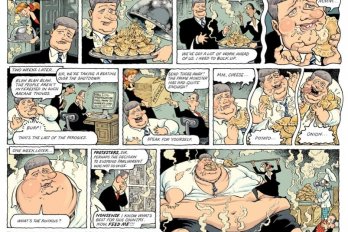Stephanie Irlbacher graduated from Samuel Hearne Secondary School, a residential/day facility for the Inuvialuit and Dene scattered throughout the northern reaches of the Northwest Territories, with the class of 1989. It was a proud day: She gave the valedictory speech as her German settler parents looked on. (They’d been strict with all four of their daughters, not even allowing them to date.) Inspired by aboriginal powerhouses like MP Ethel Blondin-Andrew and Premier Nellie Cournoyea, she was also one of the few kids in her class who’d be leaving home to pursue a degree, in political science, at the University of Alberta.
She took well to academic life, but she never lost her connection to the North. When an opportunity to move back presented itself, the newly graduated, newly hyphenated Irlbacher-Fox felt certain she had something to contribute. Her first task as assistant negotiator for the regional self-government office—training local fieldworkers to conduct opinion polls in their communities—put that assumption to the test. “Who are you to tell us about our own self-government? ” challenged a Dene translator, who had attended to pick up some relevant terminology. After three years of such confrontations, she hated her own pale face in the mirror and was convinced her job should be filled by someone from the communities. But who?
Divine Wisdom
A lofty ideal for the modern university
One of the most important blueprints for the modern liberal arts university was conceived by a cardinal. In his iconic work The Idea of a University (1873), John Henry Newman characterizes the academy as a bastion of intellectual tolerance, a space in which disparate and, at times, opposing disciplines (like theology and empirical science) can come together in the common pursuit of knowledge. Writing at a time of explosive cultural change—in the wake of Marx, Nietzsche, Mill, and evolutionary theory—Newman saw the university as a centrifugal force: “It professes to… define the rights, to establish the mutual relations, and to effect the intercommunion of one and all.” His notion that the university can act “as umpire between truth and truth” established an ideal for interdisciplinary education and a powerful connection between the ivory tower and society at large.
Fewer than 5 percent of aboriginals in the Northwest Territories have a university degree (compared with 25 percent of Canadians overall). It’s not that they’re not interested; there simply isn’t anywhere for them to go. A college in each territory offers high school equivalency and training for industry jobs, but for professional qualifications residents would have to travel at least 1,500 kilometres south to Edmonton—a world away for kids who’ve never been outside their tightly knit communities.
“Canada is the only northern State that does not have a university campus offering a full range of programs in the Far North,” wrote Michaëlle Jean on her blog after last summer’s infamous tour of the region. The governor general has emerged as one of the country’s most outspoken advocates for a northern university, having travelled across the circumpolar North gathering intelligence on sovereignty. “We absolutely cannot forget that this sovereignty is an empty shell,” she has cautioned, “without the participation of northern people.” Now, despite the usual objections (sparse population, insufficient resources, etc.), the cause has finally gained traction.
This spring, a pilot semester of Dechinta Bush University Centre for Research and Learning will see up to sixteen northern indigenous students earning fifteen credits through the University of Alberta’s native studies program. Located on the traditional lands of the Yellowknives Dene First Nations, five hours by snow machine from the capital, the field school will teach a broad range of courses relevant to a northern skill set. Participants will calculate the lodge’s diesel carbon footprint, set up micro–wind power, and operate composting toilets. They’ll study science as a methodology and traditional ecological knowledge as a cosmology. Law, writing, resource management, and political history will be taught by a roster of heavy hitters, including David Hik and possibly Severn Cullis-Suzuki.
Irlbacher-Fox, who left her job with the aboriginal self-government office in 2000 to become a star academic at Cambridge University, will teach a unit on colonialism, health, and social suffering. Using theory she advanced in her 2009 ethnography Finding Dahshaa (dahshaa is a rare type of rotted spruce wood essential to the Dene moosehide tanning process), she plans to guide students in a series of reflections on cultural validation and the insidious guises of colonialization. “Humility is key to my work,” she adds, describing a process of constant personal decolonization.
No matter how successful she is in that project, however, she will never represent the indigenous community. And that community has been adamant that it wants representation at Dechinta. “On self-government issues, they shouldn’t fly someone in to talk about it,” says Dene luminary Glen Coulthard. “They should locate the appropriate knowledge keepers locally.” At pains to improve on the track record of northern institutions, administrators have established a pool of local elders-in-residence and are arranging for some subjects to be co-taught by Yellowknives Dene. Irlbacher-Fox has been paired up with Coulthard.
Born in Yellowknife in 1974, Coulthard grew up in nearby Norman Wells, where his father owned a small business, and spent summers with his extended family in the Dene community of Dettah. When he was around ten years old, his parents moved him to Kelowna, BC, so he could take advantage of better educational opportunities there. Instead, he found the atmosphere at his largely Christian, upper-class high school, located next to a major reserve, antagonistic. “I was never very good in high school, and I took a break for most of the 1990s,” he says apologetically. In fact, he spent the latter half of the decade agitating for political change in East Vancouver.
But around the time Irlbacher-Fox was founding a reading group on indigenous rights and governance at Cambridge, Coulthard decided to give school another chance. He registered at Langara College and climbed his way to a Ph.D., defended this winter at the University of Victoria. His recent work posits “recognition”—of indigenous peoples, of rights to land, of self-government—as an empty promise that perpetuates oppression. It’s the kind of political theory that informs Irlbacher-Fox’s fieldwork, but Coulthard’s application is more radical. “My involvement [in Dechinta] is contingent on making sure Yellowknives Dene interests are met and their sovereignty respected,” he says.
The university’s success is contingent, in turn, on how this tension—between aboriginal and academic interests, theory and action—is handled. It’s a tremendous challenge, matched only by the commitment of those involved. In Yellowknife, Irlbacher-Fox has already thrown herself into writing a new book, using attachment theory to explore the Dene people’s fundamental connection to the land. Coulthard will use his semester in the territory to explore that connection through his young son and daughter, returning home to Dettah.




